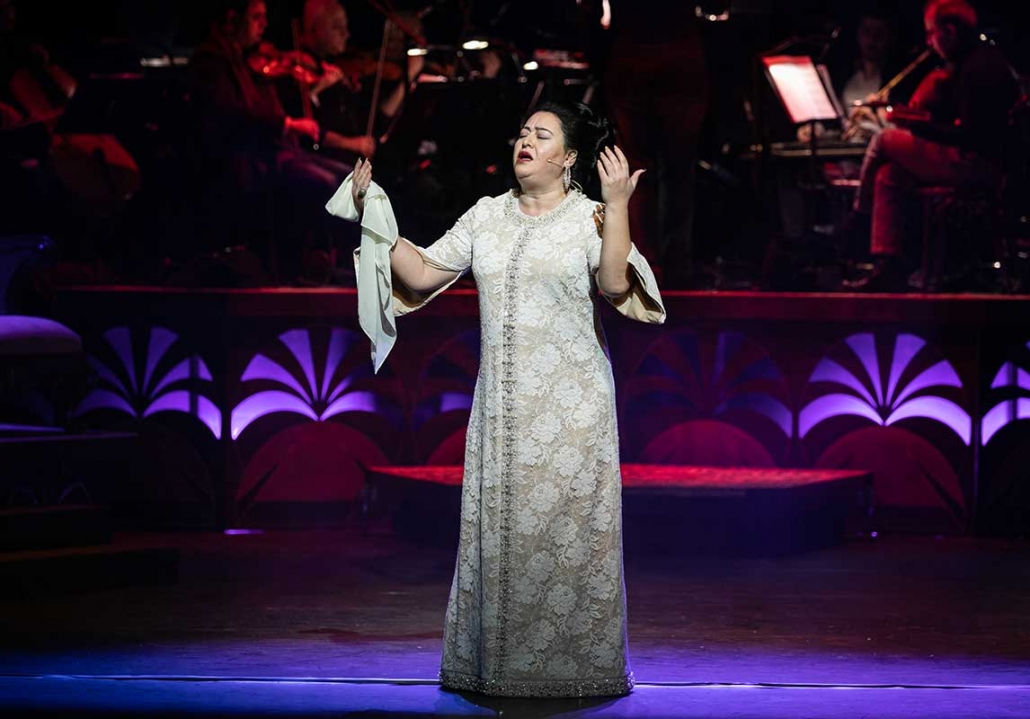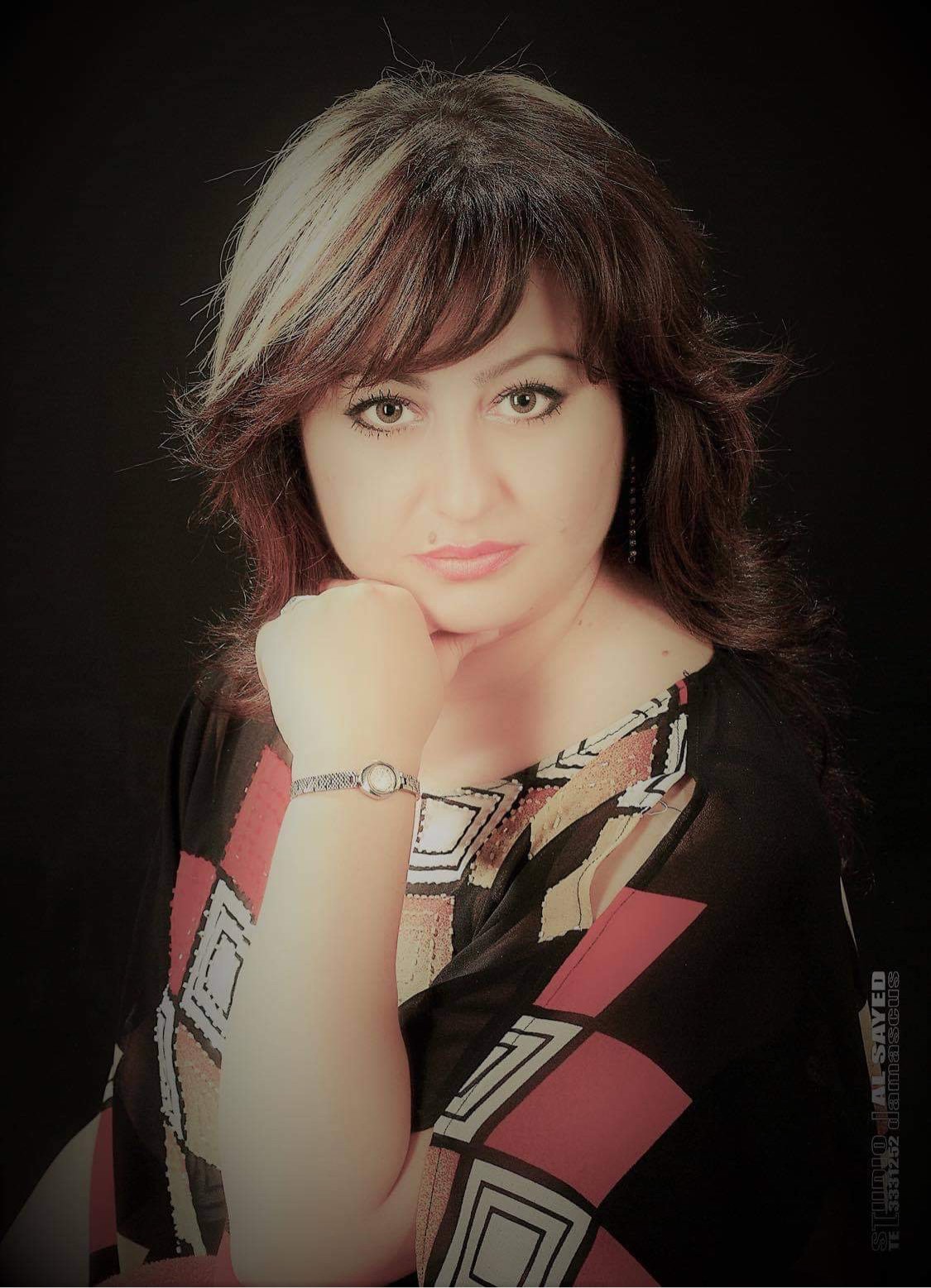Photo: Lubana as Umm Kulthum in “Umm Kulthoum, the Golden Era. A Musical Tribute” on the Palladium Theater.
On March 2nd, 2020, merley days before the global COVID19 pandemic hit London with 136 cases, Lubana Al Quntar stood backstage at the Palladium Theater, in London’s West End, anxiously nervous, yet deeply calm. Making the finishing touches on her makeup, in her dressing room’s mirror Lubana saw the legendary Arab singer Umm Kulthum staring back at her. She worked tirelessly, her entire life, for this moment. She was seconds away from starring as Umm Kulthum in “Umm Kulthoum, the Golden Era. A Musical Tribute” yet, Syria was on her mind.
As Syria’s premier Opera Singer, Lubana’s biggest success should’ve happened on the stage of the Damascus Opera House. A talent like hers has the power to uplift her entire nation. A country shattered by almost a decade-long civil war, one of the worst humanitarian crises in modern human history, unprecedented levels of violence and displacement, an economic crash, and now the COVID19 pandmeic. But alas, talents like hers are not welcome in Assad’s Syria, especially if they refuse to bend the knee. In fact, they’re persecuted and chased out.
At the start of the Syrian Uprising in March 2011, Lubana struggled with her inability to stay silent. For two months, she watched her people rise up against the Assad dictatorship, as she served as the Voice Chair for the Department of Opera Singing, at the Syrian National Conservatory in Damascus. To protest the killings of innocent civilians Lubana stopped teaching– “how could we carry on with our normal music lessons, as hundreds of people are being slaughtered a few kilometers away from us” she told her students before walking out of the Higher Institute for Music for the last time.
For weeks Lubana suffered from constant harassment by regime loyalists. Fearing for her safety, she was forced to stay home. Yet she continued to speak up on social media, and soon after she resigned her position in protest.
“If I stayed in Syria, I would’ve either been detained or killed” Lubana told me. And so she chose to accept an invitation to attend the American Film Festival in LA that year. “This invitation was a complete coincidence, it came at the right time to save my life and rescue my career”.
Within a month of her resignation, Lubana left Syria. She left her home, suddenly, thinking that she would be able to return within a few months at the latest. She left everything as it was. “I left my books, my CDs, and even my music notes open on my desk” she told me, exhaling, “I didn’t pack much, or organize anything … I left my home in a hurry”. She landed in the U.S. on November 11th, 2011. It’s been almost a decade since.
As the war escalated in Syria, Lubana’s family urged her not to return– “they were terrified”. And so she had to apply for asylum in the U.S. And just like that, she became a refugee.
For three years “I lived in a coma-like state of mind,” Lubana told me during our phone conversation, “my entire life revolved around Syria and the events unfolding there. Physically [Lubana] was in the U.S., but mentally [she] was in Syria”, waiting for the moment she could return.
Watching Syria disintegrate, falling deeply into a bloody civil war, Lubana questioned the benefit of her art. “What’s the point of music, art, and even singing?” she said. “How could I sing, knowing that a child is dying this exact moment, helplessly, alone?” At the time, millions of Syrian refugees sought help in neighboring countries, fleeing indiscriminate bombardment of their towns by the Assad regime military, and its Russian and Iranian allies. The world was paralyzed, unable to take serious action to end the crisis other than providing insufficient humanitarian assistance. Women and children make over half the Syrian refugee population.
“I became trapped. Dwelling on negative thoughts, seeing my life go to waste” until “I realized, I had no choice but to live, if not for me, for my people”.
Pulling herself up by the bootstraps, Lubana found a reason for which she could sing again – sing to help the refugees. “The only thing I could give the revolution, my family and the Syrian people is my voice … it’s all I have”. And so her new career in the U.S. began, singing at charity events supporting international organizations working to ease the suffering of Syrain refugees and internally displaced people. According to the UNHCR, there are 13.1 million people in need for humanitarian assistance inside Syria. And nearly 6 million people have fled the conflict since 2011 to neighboring countries.
“The thought of helping even one family in need, gave me enough motivation to start all over again” Lubana said with a quivering tone holding back her emotions.
“In the U.S. I started from scratch all over again, like a young 20 year-old fresh out of college singer, with small concerts of 30 or 40 people in the audience, just to say I exist. I am here”. That’s when I met Lubana, at a small gathering for the Syrian diaspora in the Washington D.C. area.
In Syria, Lubana was the first Opera student at the Higher Institute for Music in Damascus. She had to wait an entire year, after she was admitted, for the institute to establish a Department of Operatic Singing. In her second year, she had the opportunity to sing with the Syrian National Orchestra for the first time. Backstage, Lubana was nervous, busy warming up her young, yet powerful, coloratura soprano voice, when her professor stopped her and said “Lubana, you have to realize the magnitude of this historic moment. You are the first Syrian Opera singer, ever, to perform here on a Syrian stage. Be proud of yourself, and your country”.
From a young age, Lubana’s dream of becoming a singer was nurtured by her family. Syrians value higher education, and so naturally Lubana’s family insisted on her following an academic path. “I wanted to understand the science of singing, and develop my talent professionally. I couldn’t just sing”.
She refused to join the ranks of uneducated mediocre artists that the Assad regime usually supports in Syria. And in a way, Lubana’s persistence to gain the academic training her talent required was in and of itself a war declaration against a regime that wants to systematically erase the artistic identity of a proud people, knowing that the destruction of Syria’s historic high appreciation for fine arts is a mechanism to grant its existence.
“One of the regime’s tactics to maintain its stronghold on power, is to enforce a cultural blackout. The Assad regime creates artificial obstacles for professionally trained artists, like me, who have the ability to enrich the Syrian civil culture, independent of the regime itself”. And like many Syrians who dared to dream, Lubana’s education was her first step on a long path standing up to institutional injustice in Syria.
As part of her professional training, over the span of a decade between Syria and Europe, Lubana focused on Classical Arabic Singing. One of her idols is Umm Kulthum (1898 – 1975), one of the greatest singers in the history of Arabic music who influenced many artists like Bob Dylan, Maria Callas and Bono, and was praised by many world leaders including Charles de Gaulle and Gamal Abdel Nasser.
“Once you understand the proper academic foundation for classical singing, you can’t listen to just anyone” Lubana said. “I listen to Umm Kulthum, almost everyday, because I always learn something from her”.
In Damascus, Lubana launched the Department of Classical Arabic Singing at the Syrian National Conservatory. And throughout her teaching career she “applied the same western Opera singing techniques that [she] developed in [her] academic and professional training, to classical Arabic singing. And it worked perfectly.” This was revolutionary, in the Arab world “at the time there wasn’t a thing called ‘the school of Classical Arabic Singing.’ Most people sing by ear, they don’t have the proper academic foundation required for professional classical Arabic singing”. Umm Kulthum did the same thing, Lubana discovered. “In her songs, Umm Kulthum used the rules of western opera singing, like the breathing techniques, stops, and vowels, with high craftsmanship. She wasn’t improvising”.
When she was offered the role to play Umm Kulthum, Lubana was ready. She had spent her entire life training, every single day, diligently for this exact moment. “This was the first Musical theatre production ever about Umm Kulthum. There were many concerts of course before, but not a musical”.
On the sold-out opening night, at the Palladium Theater in London, Lubana entered stage left. After a short scene she opened the musical with Umm Kulthum’s song Inta Omri (you are my life), and within 90 minutes she woke up from a dream-state-of-mind to a standing ovation, applause that only the greatest artists get to experience. Then, for the first time in years, since she left her home in Damascus, Lubana felt OK. On the Palladium Theater stage, she exhaled. Her eyes teared up, she caught herself smiling, radiating from deep within, as she bowed to the audience. Finally, Lubana felt safe. She felt valued. She felt at home.
In 1995, Lubana won the prestigious title of Syria’s First Opera Singer, receiving international fame and recognition. In 1996, she won the first audience prize and fourth overall prize in a Belgrade International Singing Competition. In 2000, she was awarded fifth prize at the The Queen Elizabeth Singing Competition, Brussels, Belgium. Since 1996, she has toured internationally in over 10 countries in Europe, the Middle East, North Africa, and North America having performed over 270 times on international stages. As a coloratura soprano, Lubana sings in folk, traditional Syriac and Aramaic languages, pop, and classical opera. Lubana is represented by MAP talent agency. She continues to share her craft to promote and preserve ancient Syrian cultural heritage and peace.

